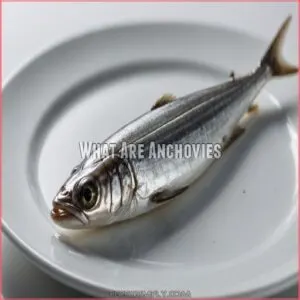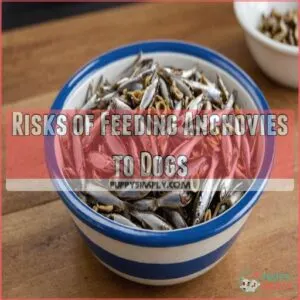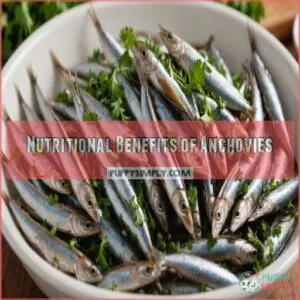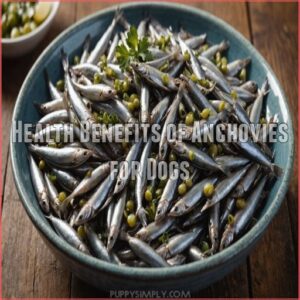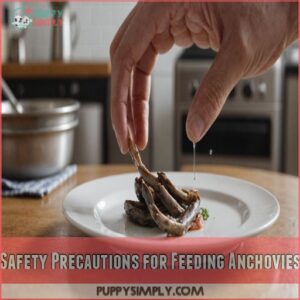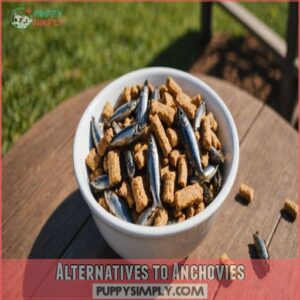This site is supported by our readers. We may earn a commission, at no cost to you, if you purchase through links.
 Yes, dogs can eat anchovies, and they might even wag their tails in delight!
Yes, dogs can eat anchovies, and they might even wag their tails in delight!
Anchovies are packed with omega-3 fatty acids, which can boost your pup’s skin and coat health, brain function, and heart health.
Make sure to serve them raw, fresh, or dried; avoid ones canned in oil or with added salt, as these can be harmful.
Whether your dog views them as a gourmet treat or just a fishy snack, moderation is key.
Keep an eye on your dog’s reaction, as some might have allergies or sensitivities.
Curious about other fishy finds for Fido? Stay tuned!
Table Of Contents
- Key Takeaways
- What Are Anchovies
- Can Dogs Eat Anchovies
- Nutritional Benefits of Anchovies
- Choosing Safe Anchovies for Dogs
- Preparing Anchovies for Dogs
- Feeding Anchovies to Dogs
- Health Benefits of Anchovies for Dogs
- Safety Precautions for Feeding Anchovies
- Alternatives to Anchovies
- Consulting With Your Veterinarian
- Frequently Asked Questions (FAQs)
- Are anchovies good for dogs?
- How many anchovies can a dog eat?
- Can dogs eat anchovies and sardines?
- Are anchovies oily fish?
- Are anchovies healthy?
- What are the different types of anchovies?
- Are sardines or anchovies better for dogs?
- Are canned anchovies safe?
- Can dogs eat anchovies in sunflower oil?
- How to cook fresh anchovies for dogs?
- How do anchovies affect dog allergies?
- Can puppies safely consume anchovies?
- Are anchovy oils suitable for dogs?
- Do anchovies impact dog dental health?
- How to store leftover anchovies for dogs?
- Conclusion
Key Takeaways
- Dogs can eat anchovies, but serve them in moderation and avoid ones canned in oil or with added salt.
- Packed with omega-3 fatty acids, anchovies support your dog’s skin, coat, brain, and heart health.
- Monitor your dog’s reaction to anchovies, especially for allergies or digestive upset, and consult your vet as needed.
- Choose fresh, raw, or dried anchovies to maximize nutritional benefits while ensuring your dog’s safety.
What Are Anchovies
When you hear "anchovies," you might picture tiny, salty fish that pack a punch on pizza, but there’s more to them than that.
These small fish, rich in omega-3 fatty acids and often found in the Mediterranean, aren’t just for bold flavors—they’re also a nutritious powerhouse.
Classification of Anchovies
Anchovies, those tiny fish packed with personality, belong to the Engraulidae family with over 150 species worldwide.
Picture them swimming in cool, temperate oceans, flaunting their sleek, silvery bodies.
While they max out at around 6 inches, their bold presence in sauces and snacks is larger than life.
If you’re pondering, “Can dogs eat anchovies?”—stay tuned for more fishy details!
Nutritional Value of Anchovies
Besides their delicious taste, what’s inside these tiny fish?
Packed with protein and omega-3 fatty acids, anchovies are nutritional powerhouses!
These essential fats are great for your dog’s skin and coat, plus they support brain function.
As a novel protein source, anchovies can be a great alternative for dogs with sensitive stomachs and allergies.
They’re also a good
Common Uses of Anchovies
Feeling adventurous in the kitchen or planning your pup’s diet?
Those tiny fishes, known for omega-3-rich fish oil supplements and a salty zing in Caesar salad or as pizza toppings, hit the spot.
But wait, can dogs eat anchovies? Absolutely! Blending anchovy paste into seafood sauces or mixing with dog food might just be the twist both you and Fido need.
Can Dogs Eat Anchovies
Thinking about tossing your pup a tasty anchovy treat?
While dogs can enjoy anchovies, it’s important to choose the right type and prepare them safely to make sure your furry friend stays healthy and happily wagging.
Benefits of Anchovies for Dogs
Imagine your pup’s coat gleaming like a shiny new penny.
Anchovies pack a punch of omega-3 fatty acids, encouraging heart health and brain support while giving that fur a lush finish.
They also bolster dog nutrition by boosting the immune system and aiding joint health.
So, sprinkle some doggy-approved anchovies into meals for a tasty health kick!
Risks of Feeding Anchovies to Dogs
While anchovies offer benefits for dogs, there are risks you should consider.
Anchovy allergies and excessive salt content can cause digestive upset.
If your dog experiences symptoms of an allergy, it’s important to consult products for dog anchovy allergy management options.
Their small size presents potential choking hazards, especially for enthusiastic eaters.
Unprocessed anchovies might lead to food
Nutritional Benefits of Anchovies
When you add anchovies to your dog’s diet, you’re giving them a nutritious boost filled with omega-3 fatty acids, selenium, and vitamin B3.
These tiny fish pack a punch with benefits like improved heart health and a shiny coat, making them more than just a salty pizza topping.
Omega-3 Fatty Acids in Anchovies
Omega-3 fatty acids in anchovies pack a punch for your dog’s health.
These tiny fish are bursting with benefits, like boosting brain function and enhancing coat shine.
Compared to salmon, anchovies might just be the underdog of omega-3 sources.
Here’s why:
- Rich in DHA for dogs
- Supports joint health
- Improves heart health
- Affordable fish oil alternative
Selenium in Anchovies
That tiny anchovy packs a selenium punch!
It’s a key nutrient for your dog’s immune system and thyroid function.
Too much selenium isn’t good, though.
You can find anchovy dog treats for your pup at this online store, which can be a great way to supplement their diet with this essential mineral.
Here’s a handy guide:
| Benefit | Potential Risk | Safe Amount (approx.) |
|---|---|---|
| Supports Immunity | Selenium Toxicity | 1-2 per week |
| Thyroid Health | Deficiency | Varies by dog size |
| Antioxidant | N/A | Consult your vet |
| Cellular Function | N/A | Moderation is key |
Remember, moderation is key!
Always check with your vet before adding new foods to your pup’s diet.
Vitamin B3 in Anchovies
Imagine this: anchovies are like little powerhouses of vitamin B3, a key nutrient for your dog’s health.
Vitamin B3, or niacin, supports brain function and enhances your dog’s coat.
If your dog’s showing a dull coat, anchovies could be the superhero snack you need.
They’re an excellent vitamin B3 source for dogs, tackling deficiencies seamlessly.
Calcium and Other Minerals in Anchovies
Anchovies don’t just bring a punch of flavor but are also loaded with calcium and other important minerals, playing a significant role in maintaining a balanced calcium intake.
These tiny fish support dog bone health, acting like little building blocks in your furry friend’s diet.
Anchovies also promote better mineral absorption, ensuring your pet gains all the benefits without unnecessary fuss.
So, they’re a tasty, nutritious
Choosing Safe Anchovies for Dogs
When picking anchovies for your canine companion, it’s like choosing the right snack for your picky human friends—only unspiced and low in salt options will do!
Stick to fresh or canned varieties in water without any added seasoning to keep your dog happy and healthy.
Best Types of Anchovies for Dogs
You’ve explored how anchovies boost dog health, now let’s pick the best ones.
Choose fish prepping methods wisely to maximize benefits.
Go for canned anchovies in water, which are soft and safe.
Try fresh anchovies, they pack a mean omega-3 punch.
Finally, consider dried anchovies—perfect as crunchy treats!
- Soft waters
- Fresh fighters
- Crunchy delights
Anchovies to Avoid Feeding to Dogs
Selecting the best anchovies for dogs is just the start.
Steer clear of salted, pickled, marinated, or oiled varieties, which can cause health issues.
You might find a wider range of options from dedicated pet food brands, such as dog anchovy brands, that are specifically formulated for canine consumption.
Here’s a quick guide:
| Type of Anchovy | Safe for Dogs? | Comment |
|---|---|---|
| Salted Anchovies | No | High sodium |
| Pickled Anchovies | No | Vinegar content |
| Marinated Anchovies | No | Often spiced |
| Oiled Anchovies | No | Contains unnecessary fats |
| Fried Anchovies | No | Unhealthy preparation |
Preparing Anchovies for Dogs
When you’re preparing anchovies for your dog, stick to simple cooking methods like boiling or steaming to make sure their safety.
Anchovies are a tasty treat for your canine companion, but it’s important to keep things simple when preparing them.
Remember, while adding a little seasoning might make your dish pop, your dog prefers their anchovies plain and straightforward.
Cooking Methods for Anchovies
Before giving your pup a fishy treat, remember safety first!
For perfectly prepared anchovies for dogs, consider these cooking methods: boiling (a simple and quick option), baking (for a slightly crispier texture), or steaming (to retain nutrients).
Dehydrating is another great way to make a long-lasting dog treat packed with omega3 fatty acids.
Avoid roasting, as it can make them too hard for your furry friend to enjoy.
Remember, always consult your vet before adding new foods to your dog’s diet, even something as seemingly simple as a fish-based dog supplement.
Adding Seasonings to Anchovies
While it might be tempting to jazz up anchovies with seasonings for your pup, stick to these tips for anchovy safety.
Use salt-free options: 1. Safe spices like a pinch of turmeric add flavor without harm.
- Herb alternatives such as parsley can freshen things up.
Be cautious of seasoning risks to avoid tummy troubles.
A little care makes anchovy safety a priority!
Whole Anchovies Vs. Fillets
Whole anchovies come with bones, offering bone safety to dogs due to their softness, which is essential since they’re low on the food chain, making them less likely to accumulate pollutants.
They’re easy to digest, too.
Fillets win in texture differences, being smoother, yet still pack omega-3 fatty acids.
Both forms deliver the nutritional content your pup craves!
Feeding Anchovies to Dogs
Feeding anchovies to your dog can be a tasty and nutritious treat, but moderation is key to keeping them healthy.
Start with a small amount to monitor their reaction, ensuring their tail keeps wagging and their tummy stays happy.
Recommended Serving Size
Got those anchovies cooked up and ready? Great! Now, let’s talk serving size.
Small dogs do well with half an anchovy, while larger companions can enjoy a full one.
Stick with fresh or dried versions for their health benefits.
Remember, it’s a treat, not a meal, so balance it based on your pup’s weight and needs.
Frequency of Feeding Anchovies
After figuring out the right serving size, decide how often to treat your pup to anchovies.
When incorporating these treats into their diet, consider consulting with a vet to make sure a balanced nutritional balance in raw diets.
These flavorful bites should be occasional snacks, not daily staples.
Aim for a weekly limit based on your dog’s size—say, a couple of anchovies for a smaller pooch.
Monitoring Your Dog’s Reaction
If you’re thinking about feeding anchovies to your dog, keep an eagle eye on their response.
Look out for any digestive upset, allergic reactions, or food intolerance signs like appetite or behavioral changes.
Steer clear of cured fish and raw fish, which may not sit well.
Always seek veterinarian advice, ensuring your furry friend’s snack doesn’t turn into a surprise tummy ache.
Health Benefits of Anchovies for Dogs
You’ll be surprised by how many health benefits anchovies offer your furry friend!
Packed with omega-3s, they can improve your dog’s skin, coat, brain function, and even heart health, making them a surprisingly healthy treat (in moderation, of course!).
Reduced Inflammation
Anchovies are rich in omega-3 fatty acids, a secret weapon against inflammation in dogs.
Whether your dog struggles with arthritis or joint pain, these little fish can help.
Think of them as nature’s supplements, offering more bite for your buck than just regular dog food.
By reducing inflammation, anchovies promote spacious zoomies, even for senior pups!
Improved Skin and Coat Health
Tired of Fluffy’s constant itching? Those omega-3 fatty acids in anchovies might be your secret weapon.
Adding fish to your dog’s diet can help:
- Reduce dry skin and itchiness, easing shedding nightmares.
- Boost that coat shine you’ve always wanted, making Fluffy the envy of every dog park.
- Manage allergies better, cutting down on vet visits and drama.
Brain Function and Memory
Think of anchovies as brain food for your four-legged friend.
Packed with DHA-rich omega-3 fatty acids, these little fish can work wonders for your dog’s brain health.
They help fend off cognitive decline and memory loss, particularly in older dogs.
Feeding anchovies boosts brain function and memory, offering substantial benefits for anchovies-loving dogs at any age.
Heart Health
For heart health, anchovies are tiny heroes in disguise, packed with omega-3 fatty acids that work wonders for your dog’s ticker.
Think of these as super snacks that help fend off dog heart disease, keeping those tails wagging longer.
They’re tasty, but they’re also a sneaky way to boost heart health without your pup knowing they’re being health-conscious.
Safety Precautions for Feeding Anchovies
When feeding your dog anchovies, it’s important to be aware of potential choking hazards, allergies, and interactions with medications.
Choking hazards are a concern, as anchovies can be small and slippery.
Allergies to fish are also possible in dogs.
Interactions with medications can occur, so it’s important to consult with your veterinarian.
By taking these safety precautions, you can help make sure your furry friend enjoys this tasty treat without any hiccups.
Choking Hazards
Prevent a choking hazard with anchovies by keeping these tips in mind.
- Whole Anchovies: Make sure the size suits your dog’s small mouth.
- Bone Size: Most anchovy bones are soft, but check each fish for safety.
- Fish Size: Cut larger fish for small dogs.
- Feeding Style: Serve them mashed to avoid any fish bones catching.
Stay safe and relish the tail-wagging delight!
Allergies and Sensitivities
Occasionally, dogs can have anchovy allergies or sensitivities.
Watch for symptoms like itching, vomiting, or diarrhea after feeding your pup anchovies.
If you see these signs, stop giving them anchovies immediately and consult your vet.
Dog food sensitivities are common, so it’s always wise to introduce new foods gradually.
If your dog has a reaction after eating certain fish, it may be due to an allergy or sensitivity to a particular type, such as allergies to certain meats. Consider safe fish alternatives like salmon or cod if your dog has a reaction.
Remember, a happy pup is a healthy pup!
Interactions With Medications
In your quest to feed Fido anchovies, keep an eye on drug interactions.
Some meds mightn’t play nice, so a vet’s approval is essential.
Anchovy safety hinges on this step to avoid medication risks.
Besides, check for food allergies—selenium and vitamin B3 are great, but not if they trigger dog food allergies.
Prioritize canine health with wise choices.
Alternatives to Anchovies
If your dog’s anchovy cravings have you fishing for alternatives, you’re in luck!
From sardines to flaxseed oil, there are plenty of tasty and nutritious options that can give your pup the benefits of omega-3s without the strong smell of the sea.
Other Fish Options for Dogs
After ensuring anchovies are safe, you might explore other fish for dogs.
Salmon, rich in omega-3 fatty acids, is a great choice.
Tuna offers variety but choose low mercury options.
Cod is mild and easy on doggie tummies, while sardines and mackerel pack a flavorful punch.
Trying different fish can keep your furry friend excited at meal times!
Non-Fish Sources of Omega-3s
When you’re looking beyond fish for omega-3 fatty acids for dogs, it’s handy to know other sources.
Flax seeds and chia seeds work wonders for dog skin and coat health.
Hemp seeds pack a punch, while walnut oil adds that heart-healthy boost.
And don’t forget algae oil, a gem for those who steer clear of fish!
- Flax seeds
- Chia seeds
- Hemp seeds
- Walnut oil
- Algae oil
Consulting With Your Veterinarian
Before introducing anchovies to your dog’s diet, it’s wise to chat with your veterinarian, who might’ve insights on how fishy remedies could affect your pup’s health.
They’ll help you tackle any potential health concerns and guide you on crafting a balanced diet that guarantees your furry friend stays happy and healthy.
Discussing Your Dog’s Diet
Exploring other fish options for dogs can lead to the question of pet nutrition.
It’s wise to chat with your vet about your furry friend’s diet.
They’ll dish out advice on dog food brands and homemade recipes considering dietary restrictions and food allergies.
Maintaining balanced treat frequency is key, ensuring anchovy benefits for dogs are safe and enjoyable.
Addressing Health Concerns
Before adding anchovies to your pup’s diet, it’s smart to chat with your vet.
They can help you avoid potential problems.
Regular veterinary check-ups, such as annual wellness checks, are essential to address any health concerns.
Consider these key areas:
- Dog allergies: Does your dog have any sensitivities?
- Pre-existing conditions: Could anchovies worsen an existing health issue?
Creating a Balanced Diet
You’ve addressed your dog’s health concerns, so let’s talk balance.
Consult with your vet about crafting a diet that includes the benefits of anchovies for dogs.
They know best about incorporating treats like omega-3 fatty acids for dogs without upsetting nutritional needs or sparking food allergies.
Mixing dog food brands or homemade recipes that include a balanced dog food ingredients list with essential amino acids, vitamins, and minerals can make sure your pup’s diet is both safe and satisfying.
Frequently Asked Questions (FAQs)
Are anchovies good for dogs?
Anchovies are great for dogs, packed with omega-3s for joint and heart health.
Just stick to unsalted, unspiced varieties.
Start small—your furry friend’s tummy might need time to adjust, so consult your vet first!
How many anchovies can a dog eat?
Most dogs can munch on a couple of anchovies per week as a delightful treat.
Larger dogs might handle up to five pieces daily, while smaller pups should stick to three.
Always consult your vet for personalized advice.
Can dogs eat anchovies and sardines?
Picture your dog savoring a gourmet fish treat!
Both anchovies and sardines are safe for dogs, offering protein and omega-3s.
Just make sure they aren’t seasoned or raw.
Always chat with your vet first.
Are anchovies oily fish?
Yes, they are!
Think of them as tiny, flavorful, oil-packed powerhouses.
Their oiliness comes from the fats in their tissues, contributing to their rich taste and nutritional benefits.
It’s a delicious fact, isn’t it?
Are anchovies healthy?
Think of anchovies as tiny, oily superheroes loaded with omega-3s, vitamins, and minerals.
They support heart health, boost brain function, and even help keep your skin glowing.
Just don’t expect them to replace your moisturizer!
What are the different types of anchovies?
Anchovies, those tiny fish with a big personality, come in over 150 species like the European, Peruvian, and Japanese anchovies.
They’re usually cured, often packed in salt or oil, and boast a unique, bold flavor.
Are sardines or anchovies better for dogs?
Choosing between sardines and anchovies for your pup feels like deciding between a rock and a diamond.
Both are nutritious, but sardines, with lower sodium levels, often make a safer, heart-friendly choice for dogs.
Always consult your vet!
Are canned anchovies safe?
Canned anchovies can be risky for dogs due to high salt content.
Anchovies packed in water without added salt or spices are a safer option.
Always consult your vet before introducing new foods to make sure they’re safe.
Can dogs eat anchovies in sunflower oil?
Dogs can safely eat anchovies in sunflower oil occasionally, but it’s best to rinse them to reduce oil content.
Too much oil can upset their tummy.
Check with your vet before adding them to your dog’s diet.
How to cook fresh anchovies for dogs?
Did you know? Omega-3-rich foods can improve your dog’s coat and brain health.
Boil, roast, or steam fresh anchovies without seasoning.
Serve them cooled, whole, or chopped, for an irresistible treat your dog will enjoy!
How do anchovies affect dog allergies?
Anchovies aren’t commonly known allergens, but they could trigger reactions in sensitive pups. Introduce them slowly; watch for itching, swelling, or digestive upset. If you see problems, ditch the anchovies!
Can puppies safely consume anchovies?
Picture puppies as explorers venturing into new flavors.
Puppies can safely enjoy anchovies in moderation.
Stick to boiled or canned in water, avoiding added salts or spices.
Always check with your vet first to make sure it’s suitable.
Are anchovy oils suitable for dogs?
You shouldn’t give your dog anchovy oils straight from the jar due to high salt and potential additives.
They’re not off the menu, though—use water-packed anchovies to avoid extra salt.
Always chat with your vet first.
Do anchovies impact dog dental health?
Imagine Fido smiling after a meal of anchovies—flossing with fish might sound wild, but these small fish can support oral health.
Rich in calcium, they strengthen teeth, but don’t rely solely on them; balance is key.
How to store leftover anchovies for dogs?
Storing leftover anchovies for your dog is simple—just place them in an airtight container and keep them in the fridge for up to two days.
If you’ve got surplus, freeze them for longer freshness.
Conclusion
Feeding anchovies to your dog can be like offering a tasty seaside treat, full of benefits.
Packed with omega-3s, anchovies boost heart and brain health and improve coat shine.
Remember, moderation is key.
Avoid anchovies canned in oil or with extra salt.
Watch for allergies, and always check with your vet about dietary changes.
Anchovies can be a healthy addition to your dog’s diet, offering a splash of flavor while keeping them paw-tastically healthy.

